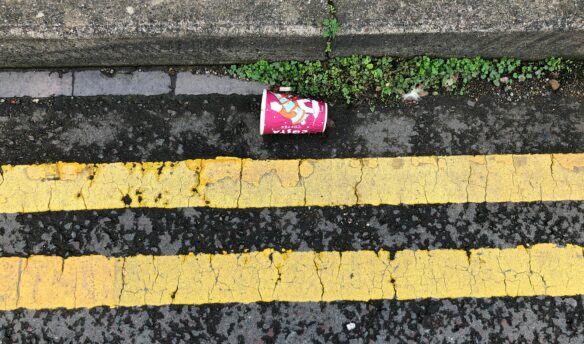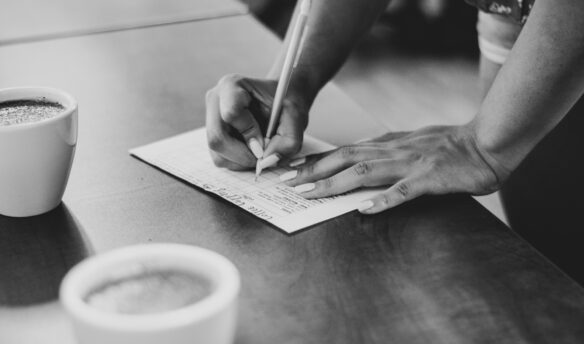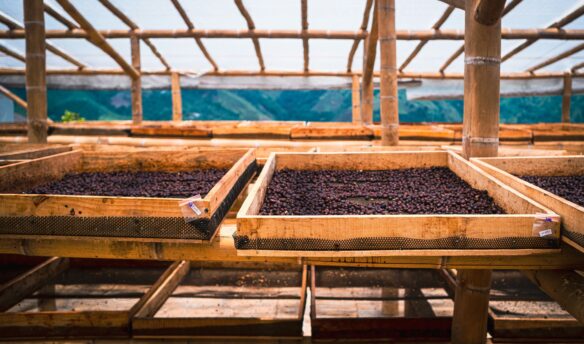Coffee is a cut-throat business. Plus, De’Longhi combines La Marzocco and Eversys to create one espresso-making powerhouse, and that hospital coffee machine is probably safe to drink from.
‘China’s New Thirst for Coffee Spurs Cut-throat Cafe Competition’ – via Reuters
China’s coffee industry is booming, a topic we’ve covered in past newsletters. An article in Reuters suggests that growing consumption is creating new opportunities for growth but also “spurring cut-throat competition between local and foreign coffee chains.”
Consumption grew 15% in the year ending September 2023, and the number of branded coffee shops increased by 58% over the same period. International chains like Starbucks and Tim Hortons are opening hundreds of new stores across China but are competing with fast-expanding local brands such as Luckin and Cotti Coffee.
“The scale of the opportunity is such that both (local and international chains) will have to be very aggressive in facing off against the other and I think that should ensure a very dynamic marketplace in the next few years,” beverages analyst Matthew Barry told Reuters.
Younger generations are fueling growing demand, which has pushed chains to expand beyond big cities like Beijing and Shanghai. Now, brands are popping up in smaller cities around the country where there is “still a lot of white space for coffee chains to grow,” Jason Yu from market research firm Kantar Worldpanel told Reuters.
And with increased consumption comes more coffee—the exporter group Cecafe estimates that imports from Brazil will triple over the next year. The USDA estimates that China will import 5 million bags over the 2023/24 growing season (author’s note: we found conflicting numbers of this statistic. Reuters reported 5 million, but a report we read from the USDA predicted that China will import 4.1 million bags over the 2023/24 growing season), making the country the world’s seventh-largest coffee consumer—although that is still some way behind the European Union and the United States, which import 47 and 25 million bags, respectively.
‘De’Longhi Forges Coffee Machine Powerhouse with La Marzocco and Eversys Tie-up’ – via World Coffee Portal
Mergers and acquisitions played a big part in 2023’s coffee news, and there’s no sign of things slowing down in 2024.
Last month, the De’Longhi Group announced plans to create “a world-class operator in the professional coffee machine industry” by combining the La Marzocco and Eversys brands into a new global business group.
The transaction involves the creation of a new corporate entity controlled by De’Longhi S.p.A, which has taken a 41.2% stake in La Marzocco from its parent company, De’Longhi Industrial S.A. The De’Longhi Group acquired Swiss super-automatic espresso machine manufacturer Eversys in 2021.
While De’Longhi says the new creation will “be able to create synergies and cross-selling opportunities,” both companies will remain separate “in order to guarantee managerial continuity and preserve the distinctive corporate cultures.”
“I am extremely satisfied with this transaction which creates a world leader in the professional coffee machine industry and a centre of technological innovation without equal in the world of coffee,” said Fabio De’Longhi, CEO and Vice President of De’Longhi Group. “The transaction represents a fundamental step to further consolidate our leadership in coffee, especially in the premium segment of the market, both consumer and professional, and was made possible by the robust cash generation that has characterised our group in recent years.”
More News
‘Ethiopia Launches $20.8 Million Coffee Land Use Program (FOLUR)‘ – via Daily Coffee News
‘Introducing Good Form, A Coffee Education Platform By Trish Rothgeb & Dan Streetman‘ – via Sprudge
‘Sumatra Coffee Farmers Brew Natural Fertilizer as Inflation Bites‘ – via Mongabay
‘Robustas Value Reaches 28-year High: ICO Report‘ – via Global Coffee Report
‘Death Metal Legends Cannibal Corpse Team with Orlando Business to Release Exclusive Coffee‘ via Orlando Weekly
‘Vollers Acquires Sensible Development Auction Platform, Launches V-Auction’ – via Daily Coffee News
‘Cerrado Mineiro Coffee Farms Produce Negative Emissions: Imaflora‘ – via Global Coffee Report
The Week in Coffee Unionizing
- A federal administrative judge ordered Starbucks to rehire, apologize to, and compensate a Colorado shift supervisor after ruling that the company illegally terminated their employment. “It really hits different when a legal document tells you you were treated unjustly,” Alendra Harris told CBS News. Harris was the lead organizer at Colorado’s first unionized Starbucks and was the “main target” of a temporary manager brought in after the staff unionized. Starbucks denies the charges and is planning to appeal the ruling.
- Students at the University of California, Riverside have launched a petition calling on the college’s administration to “[cut] all campus ties with Starbucks” in response to what it calls the company’s “scorched-earth union-busting campaign against its workers.” The petition was started by UCR’s United Student Labor Action Coalition and follows similar campaigns at Cornell University, which successfully persuaded administrators to end the school’s partnership with Starbucks.
- Baristas, bartenders and dungeon masters at Hex & Co. board game cafe in New York City have voted to unionize and join Workers United. The drive began in September 2023 when a supermajority of Hex workers informed the company of their wish to unionize, in response to which management “pleaded with their employees not to unionize, saying that a union would wipe out the ‘flexible and open-door atmosphere we have tried to foster,'” according to the New York Times. Nevertheless, the vast majority of employees voted in favor of unionizing. “There is not a group of people better at organizing than a bunch of nerds,” one worker said.
The Week in Corporate Coffeewashing
Delta Air Lines says it will eliminate nearly seven million pounds of single-use plastics on board its airplanes yearly by launching new paper cups for coffee, tea, and alcoholic drinks.
The airline says the new cups have undergone extensive testing to ensure they can withstand heat, but the article doesn’t exactly say how they do that. Most single-use paper cups have a heatproof plastic barrier, making them difficult to dispose of correctly.
Of course, the bulk of Delta’s carbon footprint comes from the fact that it’s an airline, something the company admits willingly. “As an airline, our main goal is to decarbonize our business – a lot of which will come from what we fly, how we fly, and the fuel we use,” Delta’s Chief Sustainability Officer Amelia DeLuca said. “But that doesn’t mean we shouldn’t also focus on what we can do right now within our own operation to be more sustainable. These cups are a great example of how Delta is working to address our impact through what we can control today.”
Delta, which emitted over 43 million metric tons of CO2 equivalent greenhouse gasses in 2021, is facing a class-action lawsuit over its $1 billion carbon neutrality investment. Delta pledged to mitigate all its emissions over the next decade, something the lawsuit says is “false and misleading” because it relies heavily on carbon offsets.
Speaking of disposable cups, Starbucks will now allow customers in Canada and the United States to use reusable cups at drive-thru locations and via mobile ordering. This announcement received a lot of press coverage, with much of it focusing on how it will “reduce waste sent to landfills” and help “reduce the massive amount of waste the coffee chain produces.”
While it’s good that Starbucks is allowing this—the company goes through seven billion disposable cups each year—it’s still expanding rapidly and, as we’ve noted before, produces more greenhouse gasses than Costa Rica and extracts more water than Equatorial Guinea.
Is Coffee Good For You?
Did your parents ever tell you not to touch anything at the hospital because they claimed you might get sick? Did that advice ever confuse you? Us too—but apparently, commonly touched items within hospitals are a cause for concern, with objects like doctors’ ties and even hospital bibles having been investigated as potential bacteria sources and, in some cases, banned to prevent spread.
But what about coffee makers? Should you keep your mitts off hospital brewing devices? According to researchers in Germany, coffee machines in hospitals and the homes of hospital workers probably do not spread bacterial infections. The study concluded that removing coffee machines wouldn’t help reduce infections in hospitals.
The study, published in the British Medical Journal (BMJ) and replete with little jokes and coffee puns, investigated 25 coffee makers in hospital break rooms and workers’ homes. Microbial growth was, probably unsurprisingly, detected on every coffee machine. However, most were commensals (bacteria that live in the gut or on the skin and don’t pose a health threat), and only a few were medically relevant.
“To our great relief, despite their potential for pathogen origins in nosocomial outbreaks, a general ban on coffee makers doesn’t seem necessary,” the authors write. The BMJ’s press release also notes that “the study has reportedly resulted in extensive cleaning measures”—to translate: it scared everyone into actually cleaning their machines.
The researchers will now focus on another popular hot beverage: “Our thoughts now turn to tea drinking nations. Are teapots, kettles, and hot water spouts similar breeding grounds for bacteria? Are the high temperatures in the pots sufficient to kill all potential pathogens? And what about the handles?”
Beyond the Headlines
‘Jimmy Butler’s Next Big Thing’ by Kenneth R. Olson
‘Portland’s Cafe Culture Is Changing. These Coffee Businesses Call It a New Wave’ by Paolo Bicchieri
















